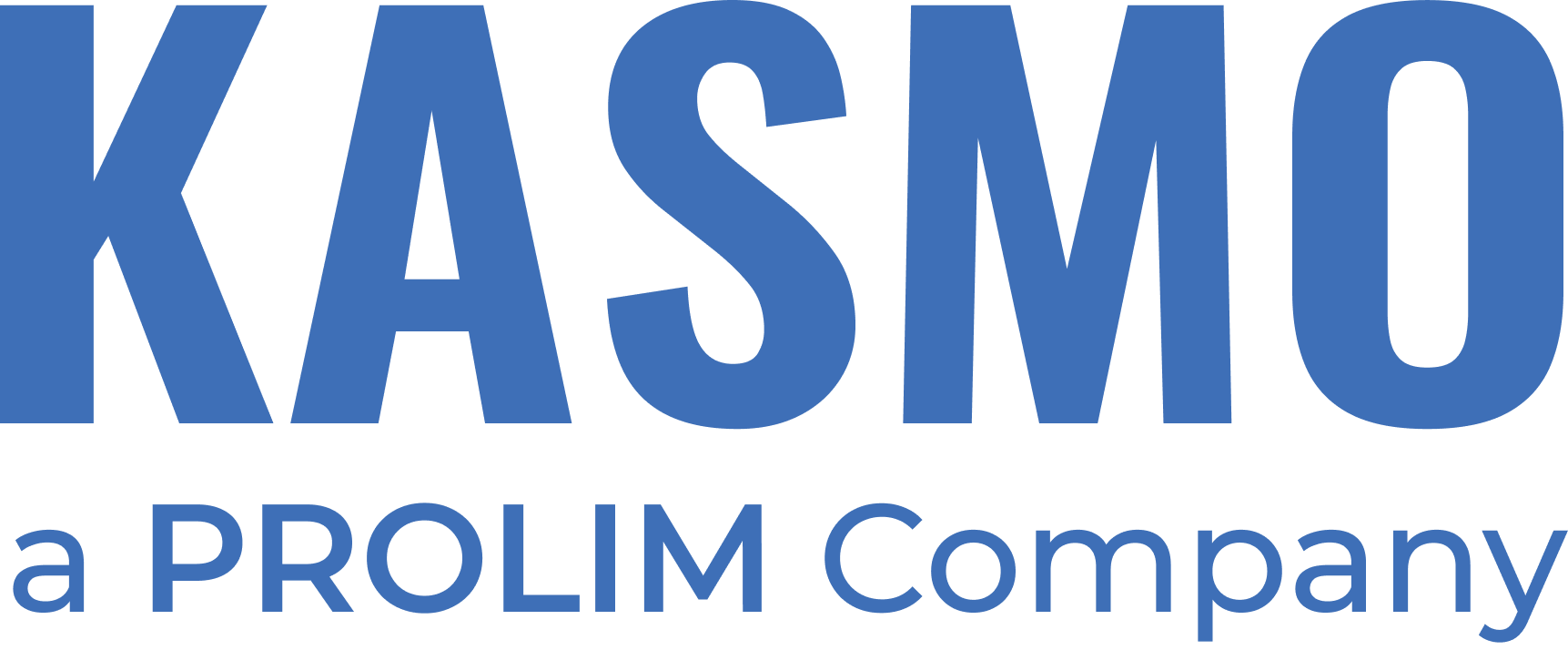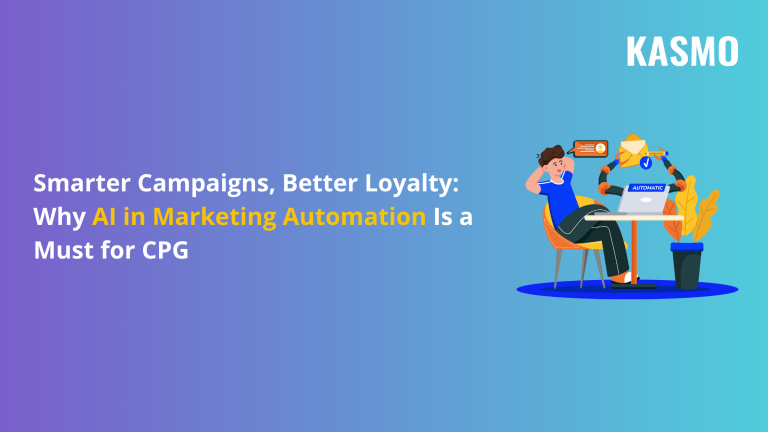How AI in Marketing Automation Is Revolutionizing the CPG industry?
According to research by McKinsey: “We estimate that by 2030, about 30 to 35 percent of all current activities across consumer functions could be automated, helping to improve workers’ productivity while adding value to the organization.” Integrating AI in marketing automation will help Consumer Packaged Goods (CPG) businesses generate more than just value: it will help them improve customer trust and build loyalty – both crucial for their long-term success.
As customer demands continue to rise, so will the competition in the market. Your competitors will increase, making it difficult for you to maintain your relevance in the market. As customers’ patience is less, with too many choices, you are often at the forefront of losing out on your loyal customers. So, what do you do?
By deploying automation for marketing, you can lessen the burden on your marketing and sales teams to keep up with administrative jobs, while they can focus on creating new strategies that will create a new and improved brand image for your business. Now your marketers will no longer be just focused on pushing products on your customers- but on creating consistent, meaningful customer experiences throughout the entire lifecycle.
Today, marketing in CPG is more than messaging; it’s about delivering value at every stage of the customer’s journey. This requires seamless collaboration across teams, a deep understanding of customer behavior, and the ability to act on insights in real time. AI agents are enabling exactly that.
Here is five practical ways AI in marketing automation is transforming how CPG brands build awareness, drive ROI, and boost customer lifetime value (LTV):

Discovering New Customers Through Intelligent Outreach
First impressions matter, and in many cases, that first interaction happens online. AI agents embedded in social media or digital platforms can proactively engage with potential customers who are exploring new brands. Whether it’s answering questions, offering comparisons, or directing users to a more relevant product or support agent, AI ensures your brand stays in the consideration set.
This is especially useful for CPG brands that rely heavily on impulse-driven purchases or seasonal trends. By being present at the decision-making moment, AI agents help transition a prospect from awareness to action quickly.
Shortening the Sales Cycle with Real-Time Responses
Speed is everything in the retail and CPG industry. AI agents can step in to answer product-related questions, check inventory availability in nearby stores, and even help users complete a purchase within a single conversation. Whether someone is looking for a specific shampoo brand or urgently needs a fitness supplement, AI agents can guide the buyer to the right product, place, and time, eliminating delays and time-to-market. By connecting with inventory systems and CRM platforms, AI agents accelerate the buyer’s journey in ways that human-only teams simply can’t scale.
Creating a Consistent Post-Purchase Experience
The sale isn’t the end; it’s an opportunity to strengthen customer relationships. Whether it’s setting up a connected appliance or following up with usage tips for a skincare product, AI can guide customers through post-purchase through preferred channels like WhatsApp, SMS, or in-app messaging. For example, smart refrigerators can be synced with AI agents to monitor settings and provide timely maintenance tips or reminders. This kind of automated, value-driven interaction enhances customer satisfaction, reduces churn, and increases the likelihood of referrals and repeat purchases.
Driving the Second Purchase with Smart Segmentation
It’s more cost-effective to retain customers than to acquire new ones. But nurturing that next sale requires relevance. AI agents help marketers identify customers who are most likely to respond to re-engagement, tailoring outreach based on previous behaviors, preferences, and optimal timing.
For instance, if a customer frequently purchases grooming products every 30 days, the AI can time the next offer just right. This kind of smart scheduling is key to increasing ROI and customer lifetime value.
Keeping Your Brand at the Top Between Purchases
Not all marketing is about conversion. Sometimes, the goal is to stay connected and relevant, even when customers are not actively buying. AI agents can assess customer loyalty signals through scores like CSAT and personalize engagement accordingly. Whether that’s sending exclusive rewards, suggesting referral programs, or even prompting an interaction on social media platforms, AI agents ensure your brand stays in the spotlight. Instead of generic drip campaigns (a marketing strategy that involves sending a series of automated, targeted emails or other messages to contacts over time) or batch and blast emails, you can tailor the AI Agents to create dynamic, personalized experiences that align with the customer’s journey and loyalty preferences.
Leveraging AI in marketing automation empowers marketers in the CPG industry to move beyond one-size-fits-all strategies and focus on high-impact, data-driven initiatives. With real-time customer insights, AI agents allow marketers to build brand equity, drive marketing ROI, and cultivate long-term customer relationships.
But to fully unlock these benefits, marketing teams must overcome manual bottlenecks, fragmented data, and increasing customer demand for personalized experiences. The future of CPG marketing lies in collaboration across teams, smarter automation, and seamless collaboration between your human and digital labor.
Role of Agentic AI in Marketing Automation in The CPG Industry
Traditional marketing automation tools and platforms are no longer enough. These legacy systems often operate in silos, provide limited personalization, and require constant human input to remain effective. But agentic AI has emerged as a transformative force, capable of reshaping the way CPG companies approach marketing, customer engagement, and operational efficiency.
Agentic AI moves beyond the limitations of rule-based automation and basic predictive analytics. It brings cognitive abilities to systems, allowing them to perceive real-world challenges, reason through complex problems, act autonomously, and continuously learn. This represents a massive shift in how organizations interact with technology, enabling marketing ecosystems that are not only intelligent but self-adaptive and self-improving.
Unlike traditional AI models that surface insights for human action, agentic AI does more than that. It makes decisions in real time, adapts to incremental challenges, and continuously optimizes performance without the need for manual intervention.
For instance, instead of merely identifying which products are performing well, agentic AI can automatically reallocate ad spend, re-prioritize campaigns, or even restructure inventory distribution based on live demand data. This level of intelligence and autonomy allows marketing teams to respond proactively to changes, whether they are fluctuations in consumer behavior, shifts in inventory, or supply chain disruptions.

Deep Data Analysis and Insight Generation
Agentic AI can process millions of data points, from CRM platforms like Salesforce, customer data platforms (CDPs), supply chain logs, and market trends, to deliver insights that are not only descriptive but actionable. These insights help marketers determine what messaging to use, which audiences to target, and how to optimize spending, all in real time.
For example, if there’s a spike in demand for baby care products in a specific region, the system can immediately recommend targeted campaigns while aligning inventory and delivery capabilities.
Personalized and Conversational Customer Engagement
By leveraging natural language processing (NLP) and machine learning, agentic AI can drive hyper-personalized interactions through email, chatbots, SMS, or even voice assistants. These systems adapt their messaging based on customer history, preferences, sentiment, and contextual behavior.
Let’s say a customer frequently purchases hair care products. The AI can not only recommend the next relevant item but also push a reminder right when the customer typically reorders, via their preferred channel.
Predictive Analytics for Smarter Marketing
Forecasting tools powered by agentic AI can predict future customer actions, product demand, or even conduct competitor analysis. These predictions help brands stay ahead by preparing the right strategies in advance.
For example, during monsoon season, agentic AI might predict increased demand for personal hygiene products and autonomously launch localized campaigns in high-rainfall areas.
Marketing Workflow Automation
From content creation and A/B testing to campaign execution and reporting, agentic AI automates a wide array of repetitive marketing tasks. It also optimizes email frequency, push notifications, and ad copy variants, based on what is performing best in real time. This frees human marketers to focus on creative thinking, branding strategies, and more.
Seamless Cross-Functional Collaboration
Agentic AI doesn’t operate in isolation; it connects various departments and systems. For instance, when sales data shows a dip in a certain product, marketing teams can automatically receive an alert to increase promotions, while the supply chain gets notified to investigate potential bottlenecks. This ensures seamless collaboration across the business, helping CPG businesses act faster and smarter.
How CPG Businesses Can Utilize the Best Potential of Agentic AI
- Recommendation Systems: Analyze purchase patterns and behavioral data to suggest products and automatically trigger orders tailored to customer segments.
- Warehouse Management: Automate inbound/outbound processes such as receiving, trailer mapping, inventory management, and Stock Keeping Unit (SKU) tracking (refers to the internal system companies use to assign a unique alphanumeric code to each product variation, allowing for precise inventory management, sales analysis, and stock replenishment), boosting efficiency and reducing manual labor.
- Order Management & Tracking: Monitor orders from placement to delivery, proactively communicating delays or rerouting options to ensure customer satisfaction.
- Supply Chain Optimization: Detect disruptions (e.g., raw material shortages, weather changes) and automatically adjust sourcing, logistics, or distribution plans.
- Product Quality Assurance: Use AI agents to detect defects on manufacturing lines, flag quality issues early, and suggest corrective actions.
- Consumer Behavior Prediction: Create personalized loyalty programs or up-sell campaigns based on behavioral clustering and past purchasing patterns.
- Shelf Space Planning: Analyze in-store movement, seasonal factors, and sales of products to optimize shelf layouts.
- Promotion and Discount Management: Dynamically optimize promotions based on sales performance, inventory levels, or demographic responsiveness.
- Packaging Innovation: Leverage sentiment analysis and social listening to refine packaging design, materials, and messaging based on customer preferences.
- Inventory Optimization: Ensure optimal inventory distribution across all warehouses and stores.
What Difference Does Salesforce Agentforce Make in the CPG Industry?
Salesforce’s Agentforce platform is transforming how CPG businesses achieve their goals by helping them deploy intelligent AI agents across marketing, sales, service, and field operations. Agentforce is more than just a chatbot. It’s powered by Salesforce’s Einstein AI and Data Cloud, which allows businesses to access real-time customer, inventory, and operational data. With the help of AI Agents, CPG businesses can not only respond, but also anticipate customer needs, automate actions, and drive decisions across the value chain.
For CPG companies, being able to deploy pre-built, customizable AI agents that can handle specific use cases like field service scheduling, order tracking, or loyalty rewards helps them stay relevant and popular with their customers. These agents are trained using a combination of business logic and real-time data through Salesforce’s Atlas reasoning engine and retrieval-augmented generation (RAG), which ensures outputs are relevant, and safe.
Take customer service, for example. Company “A”, uses Agentforce to manage order inquiries, returns, and shipping questions autonomously, reducing workload on human agents and improving customer satisfaction.
On the retail side, companies use AI agents to assist shoppers with product recommendations, in-cart support, and promo code activation, which helps them boost conversion rates and personalize the shopping experience.
Agentforce also streamlines field rep operations by using AI to automatically prioritize store visits, schedule appointments, and generate sales insights, all based on store performance, product availability, and location.
Conclusion
It’s no longer enough to just run marketing campaigns and hope for conversions. Today, the real value lies in understanding your customers deeply, acting on insights instantly, and building relationships that go beyond a single transaction. By integrating AI in marketing automation, CPG businesses can achieve just that!
This marketing automation facilitates smarter outreach, real-time support, personalization and supply chain optimization, turning reactive marketing into proactive, customer-centric marketing.
Platforms like Salesforce Agentforce enable CPG companies to move quickly and scale efficiently, without compromising product quality or customer experience. As the industry becomes more competitive and customer journeys more complex, AI agents will help CPG brands to succeed, personalize at scale, automate with intelligence, and adapt to market changes and increasing customer demands without hesitation.



